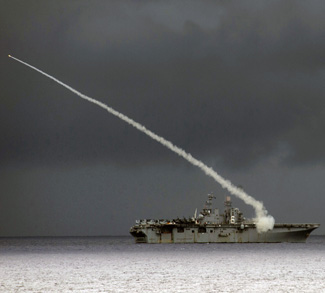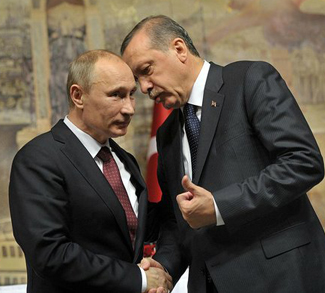In Syria, Russia has become the country without which the resolution of the conflict would have been impossible. Moscow wants a dialogue with Washington and aims to recover superpower status. Russia’s endgame in Syria is as President Obama, rightly noted during his speech before the United Nations General Assembly, to “recover lost glory.” He added “through force,” but, Russia is actually playing a highly sophisticated diplomatic game. Force and Syria are both mere instruments in a more ambitious strategy to regain superpower status.
Obama’s reach is rather limited now. On November 8, in fact, Americans will choose their next president. How Hillary Clinton or Donald Trump will manage Syria will depend much on Russia and its intentions. Certainly, given U.S. domestic interests and campaign promises, they will likely continue to focus on Islamic State. But, Russia has a wider goal of which Islamic State is but one component. Moscow’s intervention in the Syrian civil war, which intensified with the deployment of ground troops in September 2015, was as much a demonstration of the Kremlin’s desire to support the Syrian government as it was a strategic alliance between Russia and Iran. There was even talk of a Tehran-led ‘Shiite alliance’ emerging to challenge the Sunni bloc, made up by countries more dependent on Washington.
Still, Russia and Iran, remain distant from a full alliance. The recent Russian use of the Shahid Nojeh air base in Hamedan serves as an example. On August 16, The Islamic Republic granted the Russian Air Force permission to deploy its bomber planes to attack Syrian rebel positions. But, less than a week later, Iran revoked the permission. Russia and Iran now have many regional interests in common, particularly in Syria, but there are unresolved historical tensions, owing to Soviet incursions in Iranian territories after World War II. Moreover, Moscow does not want Iran to acquire nuclear weapons. Russia also fears that the comprehensive nuclear agreement might favor an eventual Tehran-Washington rapprochement. This would end up reducing Russia’s influence further.
As for Syria, Russia wants to ‘save’ its Syrian ally. It wants to show that it can deliver effective ‘protection’ to allies. Russia also sees the defeat of Sunni jihadism as a path to contain American influence in the Middle East. Syria is the crossroads for all three elements. Moscow wants to maintain a friendly government in Damascus, naval bases on the Mediterranean, and reaffirm its great power status. The Russians reject a Western-led regime change. That’s what they want to prevent, but that does not mean defending Assad’s political leadership at all costs.
Russia also has more pragmatic relations in the Middle East. If there’s any doubt about Moscow’s independent agenda in Syria – vis-à-vis Iran – consider that Tehran considers Israel an existential enemy; and the feeling is mutual. Yet, Moscow has secured even closer ties to Israel over the past few months – not to mention the fact that so many Israeli citizens were born in the Soviet Union. Moscow maintains relationships with Egypt, Turkey, and other Sunni states with which Iran is not always on good terms. Russia and Iran also compete in the oil and gas business, both are major hydrocarbon exporters. Both claim territories in the Caspian Sea region. Therefore, Russia enjoys its ties to Iran, while still being able to pursue relationships and opportunities with other countries in the region, regardless of ideological or geostrategic bent.
Therefore, in Syria, Russia is pursuing its own independent objectives. They can be summed up as three related goals. The main one is to defeat the Islamist militias like ISIS and keep them from spreading their influence to precarious Russian republics already on the edge of jihadist revolt, such as Chechnya. The map of the Middle East shows how close Russian borders are to Syria. Russia also wants to recover some of the former USSR’s regional prestige. The Soviet Union was a patron to Syria and Iraq (even when these countries were enemies in the not so distant 1980s and 90s). Finally, and in a related way, the Kremlin wants to regain international prestige.
Russians still feel the sting of humiliation at having suffered the virtual ‘defeat’ from the West, watching unwilling, and unable, to stem the democratic wave that broke the Iron Curtain in 1989-1990. There’s no bigger example of the sense of Russian humiliation than by the fact that many of those who experienced the collapse of the USSR dislike Mikhail Gorbachev. As Soviet president, he chose the path of least resistance before the demands of the people. Russians also find his successor, Boris Yeltsin, as having caved in too much to the United States. Vladimir Putin knows this. For the sake of his own power, but also out of some genuine patriotic instinct no-doubt instilled during his KGB days, he is playing the nationalist card.
He wants to restore Russia’s international prestige as do many Russians. Part of this involves opening up a wider market for Russian weapons. This also accounts for Putin’s pragmatism. Syria has offered a showcase for Russian missiles and airplanes. Russia has supplied Iran with the S-300 anti-aircraft systems needed to protect its nuclear facilities. In Syria, the Russians still think they can persuade Americans to accept their position and abandon their demand for Bashar al Assad to step down. Putin also thinks that they can continue to fight Islamic State with the United States, hoping it can persuade them that much of the so-called rebels are Islamists. Moscow is also pushing for a fast resolution to the Syrian civil war, because the Russians are convinced that Hillary Clinton will be a more formidable foe than Obama.
In a wider sphere, Moscow has supported China’s claims on the islands in the South China Sea. It has reconciled with Turkey, taking advantage of Ankara’s anger with the West, where there has been massive criticism of the attempted coup last July. Russia may be so ambitious as to want to pull Turkey away from NATO itself. Certainly, it seems that Turkey cares much less about its European Union membership ambitions now. Putin is using the coup as leverage to pull Turkey toward Asia and its emerging series of trade and diplomatic alliances such as the Shanghai Cooperation Organization (SCO).
In other words, Russia wants to regain its status as the equal of the United States, especially diplomatically. While Obama has disengaged from the Israeli-Palestinian conflict, Putin tries to organize a summit in the Kremlin between Benjamin Netanyahu and Palestinian President Mahmoud Abbas. Therefore, Putin likes to intrude in the crises that Washington has either ignored or contributed to exacerbating. In Syria, many feel that the U.S. and its regional allies played a key role in worsening the civil war, financing Islamist rebels and by way of the disastrous Iraq adventure. Overall, then, by restoring Assad’s power throughout Syria – if possible – Moscow is using the Syrian civil war to destabilize NATO, playing on the rift between Turkey and the Atlantic Alliance. Then there are the various pipeline games moving oil and gas from the Middle East and the Caspian to the Mediterranean, Syria and Turkey are important outposts for exports to Europe.




